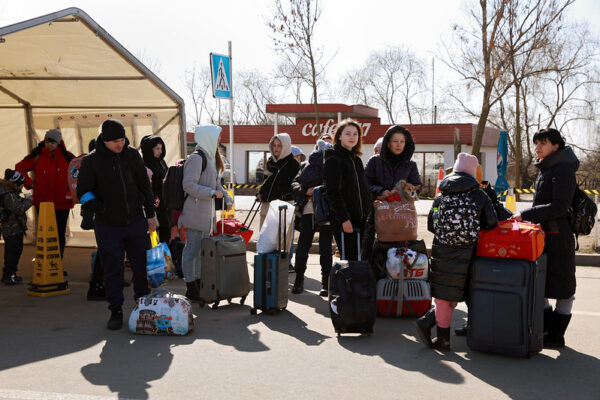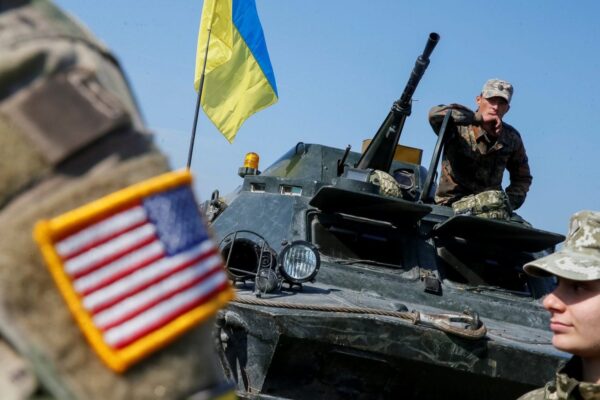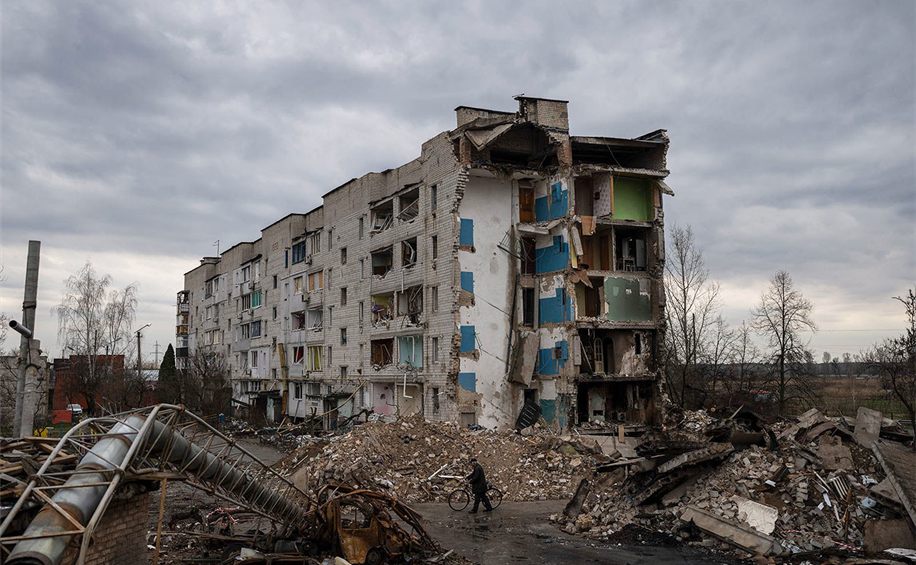It wasn’t long after Russia invaded Ukraine on February 24, 2022, that I knew I would need to teach a course on it.
Six months later, with the war in full force, I launched a semester-long course titled “The Global Politics of the War in Ukraine.”
I am an International Relations theorist who teaches at Whitman College, a small liberal arts college in Washington state. My students are bright, curious, and afflicted by that peculiar youthful American desire to change the world. My job is to liberate them from their compulsions to intervene while nurturing a sense of responsibility towards the world.
As weeks turned to months and Russian forces brutalized people and cities in Southern and Eastern Ukraine, the causes of the invasion and its long-term geopolitical implications fully immersed scholars in my field. Widely-circulated images of desperate Ukrainian refugees on trains and foreign cities evoked the horrors of World War II in Europe, a time that also marked a significant geopolitical shift.
A smaller minority of scholars raised questions about the hypocrisy of war coverage.
Why didn’t ongoing brutal conflicts, in Palestine, Tigray, and Yemen, capture the world’s imagination? Why had recent refugees from the war in Syria evoked much less sympathy or hospitality?
I knew we were in the middle of one war among many wars.
But it was a war where the biggest nuclear power in the world, led by a ruthless authoritarian leader with imperial ambitions, had openly and brazenly violated the sovereignty of a smaller, weaker neighbor. For those in the Global South whose sovereignty was routinely and mundanely violated, much was at stake
This was a European war, yes, but also a global war.
This global war would leave many dead and maimed and tortured in Ukraine. It would leave others hungry and cold all around the world. How could I teach a European war without — once again — re-centering Europe?

Photo by UN Women/Aurel Obreja on Flickr
From the very start, it was clear to me that the U.S. was not going to sit this one out. Its interventions could shape the form that “The West” took for years to come. How could I ignite my students to think critically and carefully about their own responsibility in this world shape-shifting right in front of them?
At another time after the 2003 brutal U.S. invasion of Iraq, a colleague and I took on the task of educating our students about that war. This task was not easy then, nor is it now.
Professors and students like to begin a semester with a clear structure and expectations, backed up by a syllabus that maps every week in a logical sequence with bullet points for learning goals. Readings are typically selected and assigned for every unit before the first day of class.
But now, I was about to teach a class about a war while it unfolded in real time. A war whose complex entanglements belied predictions every day.
I asked myself some questions.
What structure and what sequence of topics made sense? Asking “if sanctions work” early in the semester might yield answers that might change drastically by the end of the semester.
What if our early discussions about the possibilities of nuclear escalation were turned on their head by facts on the ground later in the semester?
How could we analyze the effectiveness of international law as evidence of war crimes revealed in bits and pieces all through the semester?
How do we gauge the limits of our knowledge with the war presented as a mediated experience curated by mainstream corporate outlets and framed by propagandists on social media?
I invited my students into an uncertain journey.
The class joined me as intrepid travelers. Together, we learned and thought and analyzed and argued. As we collectively muddled through a constantly changing landscape, we added flesh to a skeletal syllabus. We read well-weathered International Relations texts alongside new analyses cropping up. We tried out different positions on international debates about the war in Ukraine mutating over the course of the fall.
Some students who had been studying and traveling abroad in Europe when the war broke out shared how those early terrifying days reverberated in everyday conversations across the continent.
My students from Africa and Latin America explained why U.S. interventions and a remilitarized Europe raised frightening specters of a colonial past.

Photo by UkroLiberator on Wikimedia Commons
Sharp divisions emerged about the U.S. role in this war and other wars. Sometimes heated and passionate arguments erupted. Sometimes students left the classroom at the end of class still arguing with each other.
I invited guest speakers to help think through the complicated questions we all struggled to understand.
Dr. Alex Wellerstein engaged our fears of nuclear escalation. Dr. Jonneke Koomen brought her expertise on war crimes from the Rwandan genocide to puzzle through the unequal and inadequate structures of international justice. Ms. Hasmik Egian, who had been in the room during discussions of the U.N. resolutions condemning Russia, challenged us to consider the fractured United Nations politics in preventing and mediating conflict. Mr. Mouin Rabbani helped make sense of the responses of the Global South to a war in which they were being asked to take impossible sides. Patricia Zimmerman taught us about the power of Ukrainian independent media in documenting and resisting this highly mediated war.
As we sat in our comfortable classroom reading and talking, more people died and cities turned to rubble in Ukraine. More people in Northern and sub-Saharan Africa had less to eat as grain exports stopped. Many all around the world endured cold as winter came and energy prices rose. We tried to hold them in our thoughts.
I wanted my students to struggle with the big questions of war and peace during the course of a deadly war. They did. I wanted them to discover their political voices on these big questions. They did. I wanted them to make their voices public.
Through op-eds and podcasts, students tried to reach others.
One student wrote how the occupation of Zaporizhzhia frightened her about investment in nuclear energy close to home. One wrote about the power of war photography from Vietnam to Ukraine to activate movements for peace. One wrote about the devastating impact of rising rice prices in Liberia, where his family lived. Some worried about German militarization. Others worried about whether the world might divide again into new antagonisms.
If the class did nothing else, it forced my students — and me — to confront a far-away war as their war, too.
And this class, in tentative and somewhat ambivalent ways, invited the students and me to imagine the possibilities of peace in a violent world.
Shampa Biswas is an international relations theorist specializing in postcolonial theory and nuclear politics. She is the author of “Nuclear Desire: Power and the Postcolonial Nuclear Order” (2014) and has published numerous articles on nuclear non-proliferation and disarmament, globalization, and race in international relations. Funded by a Ploughshares grant, she is currently working on a project to decolonize the curriculum of nuclear studies. She has also published several essays on higher education. She serves on the Advisory Board of The Consequences of Radiation Exposure, a Washington state-based NGO.
Header photo by AP Photo/Petros Giannakouris on Flickr.

